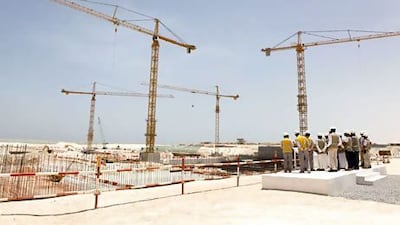The UAE energy minister has painted an optimistic picture of nuclear power two years after the Fukushima disaster in Japan but cautioned other nations to step up liability and safety practices.
Suhail Al Mazrouei spoke alongside counterparts at an International Atomic Energy Agency (IAEA) summit in St Petersburg as nuclear energy faces obstacles in public-safety fears, competition from low gas prices in North America and reduced access to credit for funding expensive reactors. In three years, renewables such as solar and hydro are set to produce double the amount of electricity generated by nuclear, according to some forecasts.
But from the perspective of the UAE, which will be home to the Arab world's first civilian reactor in 2017, atomic energy is moving along just fine.
"Countries with nuclear reactors continue to operate their reactors - 434 nuclear power reactors are in operation today, 69 under construction and more are planned," said Mr Al Mazrouei. "This demonstrates, despite the challenges, that nuclear energy will continue to play a significant role in the global energy sector."
Last month Abu Dhabi began pouring safety-related concrete for its second reactor, one of four taking shape on the coast at Baraka.
The UAE has been able to roll out its nuclear project at one of the fastest paces in the world - four years from the publication of its first policy paper to groundbreaking - and developing nations such as Kenya and Vietnam hope to follow in its wake. The speed is thanks to a lack of risk in financing capability, which has stalled reactors elsewhere, and fast regulatory approval, the bugbear of nuclear construction sites in the US.
"The reality is nuclear is indispensable as part of the global energy mix today," Hamad Al Kaabi, the UAE permanent representative to the IAEA, told The National.
"It continues to be economical and environmentally sound … Fukushima might have slowed down the expansion pace in some countries but the general global outlook for nuclear energy has not changed "
Once the domain of developed nations, nuclear growth has shifted. At this week's IAEA summit, the UAE presented alongside Turkey, which has already laid out plans to build a third nuclear power plant, and South Korea, which surprised the world in 2009 when it won a US$20 billion contract in Abu Dhabi.
Mr Al Mazrouei urged other nations to join the IAEA's Convention on Nuclear Safety, a set of benchmarks ratified by 76 nations since 1994, and to "harmonise" civil liability regimes for nuclear damage, which give people recourse to file claims in the case of an accident while limiting the total financial burden of the operator.
"Efforts to harmonise civil liability regimes for nuclear damage should continue and we encourage states which have not done so to join and implement multilateral conventions based on the principles of the Vienna Convention on civil nuclear liability," he said. "The international framework for cooperation in the area of nuclear safety and emergency should be strengthened."

